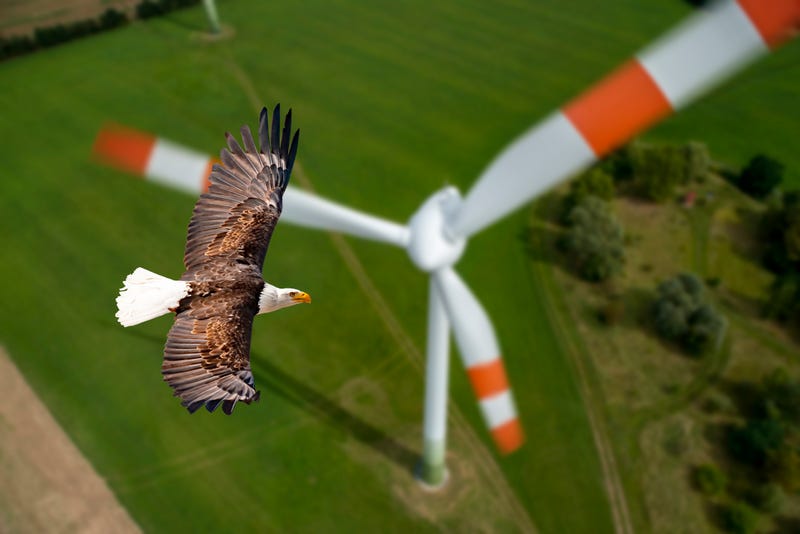
A company that operates wind energy generation facilities in several U.S. states was fined more than $1.8 million and ordered to pay more than $6 million in restitution this week for contributing to the deaths of around 150 eagles.
Of the bald and golden eagles found dead across 50 of ESI Energy’s wind energy facilities since 2012, 136 “have been affirmatively determined to be attributable to the eagle being struck by a wind turbine blade,” according to the U.S. Justice Department.
ESI is a subsidiary of NextEra Energy Resources LLC – which in turn is a subsidiary of NextEra Energy Inc. It pled guilty and was sentenced Tuesday in Wyoming for three counts of violations of the Migratory Bird Treaty Act.
This law prohibits the pursuit, hunting, shooting, wounding, killing, trapping, capture or collection of migratory birds – including bald and golden eagles – without a permit from the U.S. Fish and Wildlife Service of the Department of the Interior. Any of these actions can be referred to as “taking,” according to the regulation.
Hundreds of thousands of birds are killed by turbines each year, according to three studies cited by the American Bird Conservancy.
Bald and golden eagles are further protected under the Bald and Golden Eagle Protection Act (the Eagle Act), which also prohibits killing or wounding the eagles without a permit from the USFWS. Although the U.S. government’s position that ESI’s conduct violated both the Eagle Act and the MBTA, it accepted the company’s guilty plea to only MBTA counts.
In March 2019, the USFWS informed ESI that a planned wind energy plant in Wyoming could result in the collision of more than 60 eagles within its first five years of operation and recommended the project either not be built or that the company file for an eagle take permit. However, ESI moved forward with the project without getting the permit.
Representatives from the plant then met with USFWS representatives in July. During that meeting, USFWS again recommended that – consistent with a recommendation made by USFWS in February – the wind project not be constructed due to the risk of avian fatalities or that operations be curtailed seasonally during daylight hours.
“The defendant did not implement the recommended curtailment,” said the Justice Department.
In September 2019, the USFWS sent additional letters regarding the expected danger to eagles posed by the plant.
A year later, the plant began turbine operations. By the end of 2020, two golden eagle carcasses were found near wind turbines at the plant, known as Cedar Springs. From April 2021 to this January, another eight golden eagle carcasses were found near Cedar Springs turbines.
Between 2018 and 2019 another ESI subsidiary – Roundhouse Renewable Energy LLC – developed a different wind power facility in Wyoming. USFWS warned that this facility could also pose a danger to eagles and recommended that Roundhouse obtain a permit. From September 2020 to April 2021, four golden eagle carcasses were found near the facility’s turbines.
Two golden eagle carcasses were also found at the FPL Energy New Mexico plant in late 2020. That ESI subsidiary plant opened in 2003.
No eagle take permits were “sought by or issued to ESI in connection with the operations or repowering of any,” of the facilities, said the Justice Department.
Since ESI did not take measures to avoid the eagle deaths or comply with measures intended to mitigate harm to eagles, it “gained a competitive advantage relative to those wind energy companies,” according to the department. ESI also received hundreds of millions of dollars in federal tax credits for generating electricity from wind power.
Over the next 36 months, ESI is required to apply for permits.
In addition to the fine and restitution payment, the company has been ordered to spend $27 million on measures intended to minimize additional eagle deaths or injuries and to pay compensatory mitigation for future eagle deaths and injuries of $29,623 per bald or golden eagle. ESI was sentenced to a five-year period of probation during which it must follow an Eagle Management Plan (EMP) that requires the eagle death minimization measures and compensatory payment.
“Wyoming is graced with abundant natural resources – including both eagles and strong winds,” said U.S. Attorney L. Robert Murray for the District of Wyoming. “The sentencing today shows our commitment to both maintaining and making sustainable use of our resources. It also ensures a level playing field for business in Wyoming and ensures those receiving federal tax credits are complying with federal law.”
ESI owns other companies, in other states, including Arizona, California, Colorado, Illinois, North Dakota and Michigan.
“This prosecution and the restitution it secures will protect the ecologically vital and majestic natural resources of our bald eagle and golden eagle populations,” said U.S. Attorney Phillip A. Talbert for the Eastern District of California. “California has been awarded more than $4.6 million in restitution under this plea agreement for the deaths of at least 92 eagles within the state caused by the defendant and affiliated companies.”
ESI and its affiliated companies’ actions “were taken under an admitted nationwide posture and alleged corporate policy of not applying for eagle take permits,” the Justice department revealed.
“For more than a decade, ESI has violated those laws, taking eagles without obtaining or even seeking the necessary permit,” said Assistant Attorney General Todd Kim of the Justice Department’s Environment and Natural Resources Division. “We are pleased to see ESI now commit to seeking such permits and ultimately ceasing such violations.”


